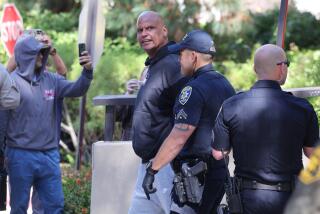Jail Bars Reporter Who Was Let In to Speak With Pellicano
- Share via
The Metropolitan Detention Center in Los Angeles has barred a New York Times reporter from the facility for allegedly misrepresenting herself in an effort to interview Anthony Pellicano, the celebrity detective at the center of a Hollywood wiretapping scandal.
Allison Hope Weiner, who has written about the Pellicano case, got into the jail last month after presenting a State Bar of California card and asking to speak with the investigator. Weiner, who earned a degree 20 years ago from the USC law school, is registered with the California bar but has never done legal work for Pellicano or the New York Times.
Michael Benov, warden of the detention center, issued an order in February saying that, for security reasons, no one could visit Pellicano except his lawyer or immediate family. After learning that Weiner was admitted to a room in the jail where prisoners meet with their lawyers, Benov ordered an investigation.
Guards brought Pellicano from his cell to the meeting room, but he refused to talk to Weiner after learning that she was a reporter.
A spokeswoman for the New York Times confirmed that Weiner had received a letter from Benov permanently barring her from the facility.
The spokeswoman, Diane McNulty, said the newspaper believed that the ban was unjustified and intended to appeal Benov’s action to the regional director of the federal Bureau of Prisons.
Benov and detention center spokeswoman Monica DeVore did not respond to requests for comment.
Weiner referred questions to the New York Times spokeswoman.
The reporter, who writes for the newspaper under contract, went to the detention center June 14 and asked to speak to Pellicano, who is being held without bail while he awaits trial on racketeering and wiretapping charges.
According to McNulty, Weiner identified herself as a New York Times reporter. The spokeswoman said officials informed Weiner that only immediate family members and lawyers could see the inmate. Weiner then told the guard that she was a journalist and a lawyer -- “but not Pellicano’s lawyer,” McNulty said.
“Our reporter was very clear and forthright about her intentions and who she was,” McNulty said.
The New York Times ethics code states that “staff members may not pose as police officers, lawyers, businesspeople or anyone else when they are working as journalists.”
According to McNulty, the guard told Weiner that because she was a lawyer, she might be able to see Pellicano if she returned later that day. Weiner did so. After she filled out the “appropriate paperwork” and showed her State Bar card, McNulty said, the guard led her to the room to which Pellicano was brought.
A lawyer entering the prison to meet with an inmate must complete and sign a one-page form consenting to a search and agreeing not to bring in any contraband. On the form, the word “legal” is preprinted in boldface, capital letters next to “purpose of visit.”
McNulty said she did not know whether Weiner had filled out that form.
The spokeswoman said that when Pellicano entered the room, Weiner identified herself as a reporter for the New York Times and the inmate told her that he did not want to speak to her.
Pellicano described the meeting from his perspective.
“I was upstairs in my cell and was told by the guards that ‘my lawyer’ was here to see me,” he said in a statement relayed by his attorney, Steven F. Gruel. “I told [the guards] I did not think that was possible, because I knew that my only lawyer, Mr. Gruel, had returned to San Francisco the day before.”
Pellicano said the guard insisted that his lawyer was waiting and led him down to the meeting room.
“I’m outraged,” Pellicano said in the statement. “Based on my knowledge of MDC procedures, I believe this reporter misrepresented herself as my attorney by using her legal bar card to get in to see me.”
He said he reported the incident to the warden. Gruel told the jail’s legal department what happened.
“I was shocked,” Gruel said. “Every time I go to see him ... it’s like trying to get into Ft. Knox.”
More to Read
Sign up for Essential California
The most important California stories and recommendations in your inbox every morning.
You may occasionally receive promotional content from the Los Angeles Times.










